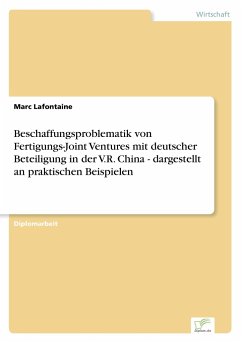Diploma Thesis from the year 2004 in the subject Business economics - Trade and Distribution, grade: 1,0, University of Applied Sciences Nuremberg (Betriebswirtschaft), language: English, abstract: Inhaltsangabe:Abstract:
Since the reforms of 1979, the People`s Republic of China`s (PRC) economy has experienced significant growth. There is no doubt that this economic expansion has been a direct result of the opening up of Chinese companies to foreign investors. The number of sino-foreign joint-ventures, which are by the way a privileged form of investment granted by the Chinese government, has been increasing rapidly. According to Chinese statistics, at the end of 1998, Chinese-foreign joint-ventures represented approximately two thirds of about 300 000 foreign investment projects that were approved by Chinese authorities. In fact, among the developing countries, China is currently the one which attracts the most western investments. Joining the World Trade Organization (WTO) in 2001, China pushed this development even further and while other countries were fighting a recession at the same time, it was able to sustain a growth of 7.8% regarding the Gross Domestic Product (GDP), 14.1% with respect to exports and 10.4% regarding imports.
Consequently there is steady interest of foreign companies to form joint-ventures in the People's Republic of China. But whereas in the 1980ies mostly the huge corporations where entering this market, nowadays more and more midsized companies, for instance from Germany, are forming joint-ventures too. From the region Mittelfranken for example 320 businesses have developed ties with the People s Republic a plus of 60% from 1996. Many foreign firms are considering entering joint-ventures in China because this seems to offer the most attractive method for gaining access to the huge potential of the labour pool and market of China. Nonetheless, there are many warnings about the problems that have to be faced in order to establish a joint-venture in China. Chief among these is the problem of differing management styles between Foreign and Chinese partners.
Very little accurate information is available about Sino-Foreign joint-ventures. An example is the wide disparity in the reports of the numbers of Sino-German joint-ventures. It is not surprising, therefore, that the majority of research studies have focused on identifying the number and the internal structures of these joint-ventures rather than on the practical problems of managing these businesses effectively.
Beyond problems of identifying active ventures, research on Chinese-German joint-ventures is hampered by other difficulties: collecting data that is accurate, collecting data from Chinese staff and evaluating their attitudes and answers. This study seeks to overcome these difficulties by assessing the attitudes of Chinese students in Germany about the cultural differences they have experienced during their time in Germany. The cultural values which may be responsible for the existence of the attitudes are discussed at the beginning of this paper. On the other hand a study of the literature, especially of best practice papers on this topic, will be conducted. Subsequently the resulting cultural issues which may interfere with joint venture success are identified and possible solutions to these problems are suggested.
Inhaltsverzeichnis:Table of Contents:
Table of contents1
Table of abbreviations and Table of figures2
1.Introduction5
2.Structure of the Chinese industry10
2.1.Growth and Direct Investments9
2.2.Qualification and Training10
2.3.Definition IJV12
3.Chinese Culture15
3.1Language15
3.2Religion17
3.3School of thought17
3.4Values18
3.4.1Communism and Socialism18
3.4.2Confucianism19
3.4.3Collectivism and Buddhism20
3.4.4Taoism22
3.5Legal Culture23
3.5.1Laws and co...
Hinweis: Dieser Artikel kann nur an eine deutsche Lieferadresse ausgeliefert werden.
Since the reforms of 1979, the People`s Republic of China`s (PRC) economy has experienced significant growth. There is no doubt that this economic expansion has been a direct result of the opening up of Chinese companies to foreign investors. The number of sino-foreign joint-ventures, which are by the way a privileged form of investment granted by the Chinese government, has been increasing rapidly. According to Chinese statistics, at the end of 1998, Chinese-foreign joint-ventures represented approximately two thirds of about 300 000 foreign investment projects that were approved by Chinese authorities. In fact, among the developing countries, China is currently the one which attracts the most western investments. Joining the World Trade Organization (WTO) in 2001, China pushed this development even further and while other countries were fighting a recession at the same time, it was able to sustain a growth of 7.8% regarding the Gross Domestic Product (GDP), 14.1% with respect to exports and 10.4% regarding imports.
Consequently there is steady interest of foreign companies to form joint-ventures in the People's Republic of China. But whereas in the 1980ies mostly the huge corporations where entering this market, nowadays more and more midsized companies, for instance from Germany, are forming joint-ventures too. From the region Mittelfranken for example 320 businesses have developed ties with the People s Republic a plus of 60% from 1996. Many foreign firms are considering entering joint-ventures in China because this seems to offer the most attractive method for gaining access to the huge potential of the labour pool and market of China. Nonetheless, there are many warnings about the problems that have to be faced in order to establish a joint-venture in China. Chief among these is the problem of differing management styles between Foreign and Chinese partners.
Very little accurate information is available about Sino-Foreign joint-ventures. An example is the wide disparity in the reports of the numbers of Sino-German joint-ventures. It is not surprising, therefore, that the majority of research studies have focused on identifying the number and the internal structures of these joint-ventures rather than on the practical problems of managing these businesses effectively.
Beyond problems of identifying active ventures, research on Chinese-German joint-ventures is hampered by other difficulties: collecting data that is accurate, collecting data from Chinese staff and evaluating their attitudes and answers. This study seeks to overcome these difficulties by assessing the attitudes of Chinese students in Germany about the cultural differences they have experienced during their time in Germany. The cultural values which may be responsible for the existence of the attitudes are discussed at the beginning of this paper. On the other hand a study of the literature, especially of best practice papers on this topic, will be conducted. Subsequently the resulting cultural issues which may interfere with joint venture success are identified and possible solutions to these problems are suggested.
Inhaltsverzeichnis:Table of Contents:
Table of contents1
Table of abbreviations and Table of figures2
1.Introduction5
2.Structure of the Chinese industry10
2.1.Growth and Direct Investments9
2.2.Qualification and Training10
2.3.Definition IJV12
3.Chinese Culture15
3.1Language15
3.2Religion17
3.3School of thought17
3.4Values18
3.4.1Communism and Socialism18
3.4.2Confucianism19
3.4.3Collectivism and Buddhism20
3.4.4Taoism22
3.5Legal Culture23
3.5.1Laws and co...
Hinweis: Dieser Artikel kann nur an eine deutsche Lieferadresse ausgeliefert werden.








